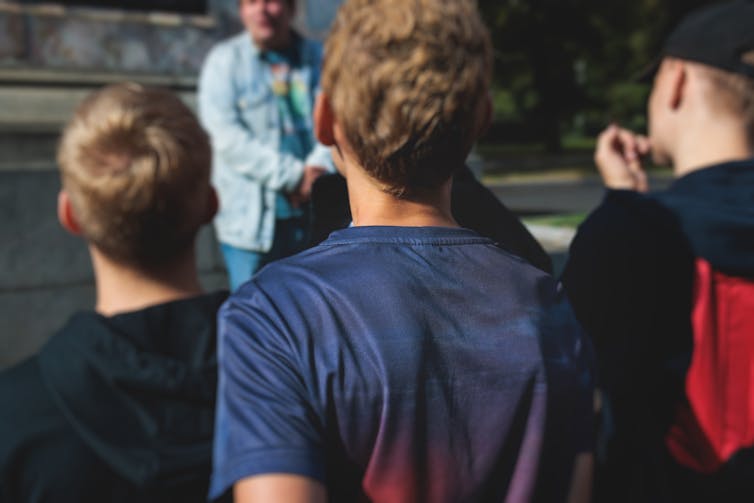
The Netflix series Adolescence has sparked important conversations about the role of social media in spreading harmful content. It has widened the public’s understanding of the rampant uptake of digitally disseminated misogyny, the legacies of Andrew Tate and those like him, and the violence perpetuated by the manosphere. Prime Minister Keir Starmer has even supported a plan to show the series to young people in schools.
But when the term “misogyny” is brought up in reference to the manosphere, girls and women often become abstract representations of victimhood. Their voices are missing. Conversation around Adolescence, as well as wider coverage on the online misogyny, tends to prioritise the opinions, behaviour and experiences of boys and how they can be supported.
Very little so far has been said about how those victimised feel towards the cultural uptake of misogyny. We need to know how this is playing out in real time in and around schools for girls, and what structures of support are necessary for them.
The crux of online misogyny lies in the systemic dehumanisation of women and girls. We need this to be a part of the discussion and to find solutions.
In 2021, in the wake of COVID-19, an Ofsted review explored sexual abuse in schools and colleges. Girls were asked about the types of sexual behaviour they experienced among their peer group. 92% of girls mentioned sexist name calling, and 88% said that they or their peers had received unsolicited explicit pictures or videos.
Similarly, one of us (Jessica) has carried out research with colleagues on over 600 young people on their experiences of sexual violence online and at school. The research found that 78% of all participants had experienced harms that included misogynistic, sexually harassing or homophobic comments, and image-based sexual abuse.
For almost all the young people in the study – 98.5% – these experiences had increased during COVID-19.
The other of us (Chiara), is conducting doctoral research into teenage girls’ online experiences. So far this research has found that most participants had been negatively affected by rhetoric of online misogyny influencers, both online and offline. For most, these negative experiences involved behaviour from their male peers at school.

The girls recounted seeing a lot of manosphere content online and hearing discussions at school, which they found “unsettling” and “scary” as they promoted harmful body image and toxic sexual scripts. Much of this related to the standards boys in their schools would set for girls’ appearance.
The girls also discussed how boys at their school did not understand the seriousness of their misogynist behaviour. “They do it to wind us up, to get a reaction from us … to them it’s all a joke,” one girl said.
This aligns with previous research by Jessica and her colleagues on manosphere messages and the sharing of nude images in school. Misogyny is legitimised as part of lad banter. “It’s normalised with boys to like to behave that way, I think,” a year-nine girl (aged 13-14) in one study said.
An everyday reality
Young people are already very familiar with, and regularly deal with, the mundane reality of misogyny in their everyday lives. They do not need to be shown a television show, like Adolescence, which sensationalises and dramatises misogyny through the murder of a young girl. This show was not intended for educational purposes and would do little to change misogynist attitude of boys while potentially terrify girls.
When addressing the radicalisation of boys online, the experiences of those who have been victimised need to be included. Young people should be taught to recognise patriarchal power structures and to be critical of online media, so they can better identify manosphere type messaging that legitimises misogyny.
Unfortunately, although relationships and sex education is now a compulsory subject in UK schools, it is often poorly resourced and low priority. It does not necessarily cover issues such as sexual violence and misogyny, nor does it typically connect the dots to how sexual violence is normalised in digital and non-digital environments. Jessica and colleagues have co-produced relationships and sex education lessons that cover the complexity of online and offline sexual harassment, abuse and misogyny.
Politicians across the UK need to make a systematic and concerted effort to support and regulate high-quality relationships and sex education. Training for teachers is necessary to address issues of sexual violence in a wider and more comprehensive way.
Relying on a TV show that sensationalises misogyny and the manosphere, re-centres masculinity and erases the experiences of those victimised including girls and gender diverse youth, will not solve any of the pressing contemporary issues around the influx of digitally exacerbated misogyny.
Jessica Ringrose receives funding from Arts and Humanities Research Council
Chiara Fehr does not work for, consult, own shares in or receive funding from any company or organisation that would benefit from this article, and has disclosed no relevant affiliations beyond their academic appointment.
This article was originally published on The Conversation. Read the original article.







